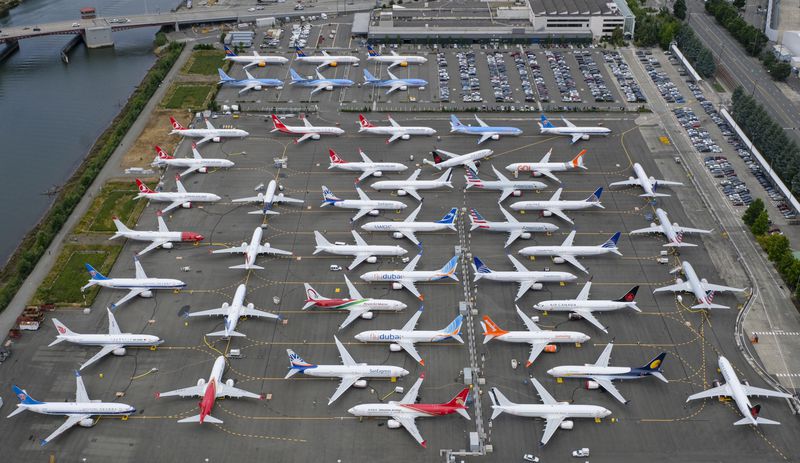CHICAGO, IL – Boeing made an announcement on Monday shocked the aviation industry when stating all 737 jets will be grounded in January. This is a drastic step after the Federal Aviation Administration (FAA) said its review of planes would continue into 2020.
Until now, Boeing has continued to produce 737 jets at a rate of 42 per month and purchasing parts from suppliers at a rate of 52 units per month, though deliveries are frozen until regulators approve the aircraft to fly commercially again (CNBC). The grounding of 737 jets will have an effect throughout the aerospace’s supply chain and broader economy. Further problems for airlines may continue, as hundreds of millions of dollars and thousands of flights are canceled.
The 737 Max has been grounded since March after two fatal crashes in Indonesia and Ethiopia killed all 346 on board both flights within a five-month period. Grounding the 737 Max’s has cost the plane manufacturer more than $9 billion so far. Boeing acknowledged the regulators’ review of the planes although it is lasting longer than the end-of-year approval the Chicago-based manufacturer was targeting.
On both deadly flights, a fault sensor caused MCAS to push the plane’s nose down, and pilots were unable to control the plane. Boeing has noted they are now making the nose-down less frequent and powerful by adding redundancy to tie it to two sensors and two computers.
Rep. Peter DeFazio, the chairman of the House of Transportation Committee, said, “This will be the most thoroughly scrutinized fix in the history of the aviation industry.”
“We know that the process of approving the 737 Max’s return to service, and of determining appropriate training requirements, must be extraordinarily thorough and robust, to ensure that our regulators, customers, and the flying public have confidence in the 737 Max updates,” Boeing said in a statement. “The FAA and global regulatory authorities determine the timeline for certification and return to service. We remain fully committed to supporting this process.”
In March, nearly 400 Max planes were in global fleet when regulators grounded the planes. Boeing has continued to produce more than 400 more jetliners, which are currently parked at its facilities in Washington and elsewhere. Going on the 10th month of being grounded, planes have been paused from being delivered to customers, and Boeing said halting production all together would help deliver the stores planes when the grounding is lifted.
It’s unclear when the 737 Max production line will be cleared by regulators to fly again. U.S. airlines have taken the planes out of their schedules until at least March. American Airlines stated they don’t expect to fly the planes before April. Southwest Airlines has extended cancelations from the grounding until April 14, 2020.
Analysts highlight Safran SA and Senior Pic as other suppliers that could experience disruption impacts. Smaller suppliers with smaller cash cushions are more vulnerable to the product pause. Southwest Airlines, the largest 737 Max customer, said last week they had reached a confidential compensation agreement with Boeing for a proportion of a projected $830 million hit to operating income in 2019 from the grounding. According to Boeing, there are no layoffs or furlough expected at this time.
Victims of the deadly crashes were from more than 35 countries aboard Lion Air Flight 610 and Ethiopian Airlines Flight 302. The Dinizulu Law Group offers our deepest condolences to all that were affected by the crashes. The Dinizulu Law Group is located in Chicago, IL where Boeing is currently facing litigation for families affected.
The laws that govern the sky can be complex, which is why it takes a seasoned legal team to successfully represent victims of aviation accidents. It’s important to hire an attorney who has the trial experience and legal resources to tackle the detail-oriented litigation required in cases against airline companies. If you need legal advice related to the loss of a loved one from an aviation accident, our personal injury attorneys can give you answers in a free consultation. To schedule an appointment, please call our office at (312) 384-1920. For additional information, please refer to our website.



